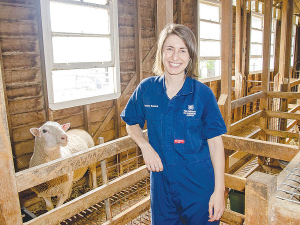Researchers at the University of Queensland are investigating ways to lift the low success rate of artificial insemination (AI) in sheep.
They believe this would improve wool and meat yields, sustainability and enhance animal welfare.
Lecturer in Veterinary Reproduction at UQ’s School of Veterinary Science, Dr Taylor Pini, says artificial insemination of sheep was notoriously difficult, resulting in pregnancy rates below 30%.
“Unlike most domesticated species, we can’t achieve high pregnancy rates using frozen semen due to the peculiar anatomy of the sheep’s cervix,” she explains.
“This research will specifically look at the biochemical interactions between previously frozen sperm and the cells within the sheep’s cervix.”
Pini says if they figure out what’s going wrong in the normal physiological interaction, they hope to identify biological pathways to intervene and improve pregnancy success rates.
She adds that more reliable AI in sheep would lead to rapid production gains as producers gain access to elite male genetics without the biosecurity risks involved in moving rams.
“Alongside improvements in traits like wool and meat yields, AI would also allow for the selection of animals that have a reduced climate impact and an enhanced capacity to cope with the changing climate,” Pini adds.
“Making artificial breeding technologies more accessible for producers would be huge for the industry.”
Only around 5% of sheep in Australia are bred using artificial insemination, compared to the Australian dairy industry which boasts rates of 85%.
Pini says in the dairy industry, AI has allowed for rapid genetic improvements in cows while the sheep industry has been restricted to much slower progress through natural mating.
“Existing insemination methods haven’t evolved in more than 40 years, highlighting the need for fresh new ideas with both commercial and animal welfare interests front of mind.”
This research is supported by a grant from Australian Wool Innovation (AWI) as part of the Science and Innovation Awards for Young People in Agriculture, Fisheries and Forestry.
AWI chief executive John Roberts says genetic gain is fundamental to breeding resilient, productive sheep and driving a sustainable industry.
“Accelerating this through effective, lowcost cervical AI would be a major breakthrough for the Australian wool industry,” he says.











